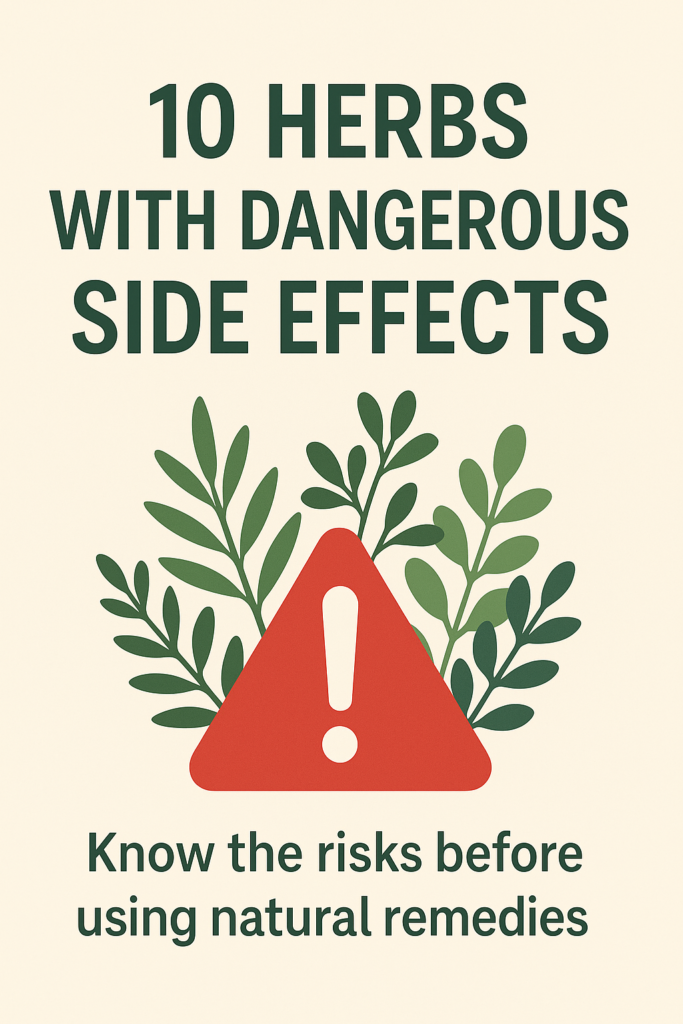
Introduction
Many people believe that natural remedies are always safe when it comes to health and wellness. After all, herbs have been used for centuries in traditional medicine. However, natural doesn’t automatically mean harmless. Some herbs can cause serious side effects, especially when misused or combined with other medications. Understanding the risks associated with certain herbs is crucial for protecting your health.
Why Herbs Can Be Dangerous
Herbs are powerful substances that can affect the body in many ways, both positively and negatively. Unlike prescription drugs, herbal supplements are often not thoroughly regulated. This lack of oversight can lead to unpredictable results, ranging from mild discomfort to severe organ damage. Additionally, herbs can interact dangerously with medications, complicating existing health issues.
10 Herbs with Serious Side Effects
1. St. John’s Wort
Often used for mild depression, St. John’s Wort can interfere with antidepressants, birth control pills, and blood thinners. It can cause increased sensitivity to sunlight, anxiety, and digestive issues.
2. Comfrey
Known for its traditional use in wound healing, comfrey contains pyrrolizidine alkaloids that are toxic to the liver. Internal use has been linked to liver failure and even cancer.
3. Kava
Promoted as a natural remedy for anxiety, kava has been associated with serious liver damage, including hepatitis, cirrhosis, and liver failure.
4. Ephedra
Previously popular for weight loss and energy boosts, ephedra has been banned in many countries. It can cause heart attacks, strokes, and even death due to its stimulant effects.
5. Licorice Root
While beneficial for digestive issues in moderation, excessive licorice root consumption can lead to high blood pressure, low potassium levels, and muscle weakness.
6. Ginseng
Ginseng is used to boost energy and immunity. However, high doses may cause insomnia, headaches, rapid heartbeats, and significant fluctuations in blood sugar levels.
7. Goldenseal
Marketed for its immune-boosting properties, goldenseal can cause nausea, vomiting, and liver problems, especially when taken in large amounts.
8. Pennyroyal
Traditionally used for colds and digestive issues, pennyroyal oil is highly toxic. Even small amounts can cause seizures, liver damage, and in severe cases, death.
9. Yohimbe
Used as a remedy for erectile dysfunction and athletic performance, yohimbe can dangerously elevate heart rate and blood pressure and cause kidney failure.
10. Aristolochia (Birthwort)
Historically used for arthritis and weight loss, Aristolochia contains compounds that are both carcinogenic and highly toxic to the kidneys. Its use has been banned in several countries.
Warning Signs and When to Avoid Herbs
It’s important to pay attention to warning signs such as unusual fatigue, skin rashes, gastrointestinal issues, headaches, or mood changes. Individuals who are pregnant, breastfeeding, dealing with liver or kidney diseases, or taking prescription medications should be especially cautious and consult a healthcare provider before using herbal remedies.
Safer Alternatives and Precautions
Choosing herbal products from reputable, well-researched brands can reduce risks. Always read labels carefully, research appropriate dosages, and be aware of potential interactions with other medications. Consulting a knowledgeable healthcare professional before beginning any herbal regimen is the safest path.
Conclusion
Herbs offer incredible healing potential, but they must be used wisely. Recognizing that natural products can have powerful — and sometimes harmful — effects is essential for making informed decisions about health. Always take precautions, stay informed, and seek professional guidance when considering herbal remedies.
Bonus: FAQ Section
Are all herbs safe to use?
No. Some herbs can cause serious side effects or interact dangerously with medications.
What herbs should not be mixed with medications?
Common examples include St. John’s Wort (antidepressants), Kava (liver medications), and Ginseng (blood sugar medications).
Is it safe to take herbal supplements every day?
It depends on the herb and the individual’s health status. Consulting a healthcare provider is recommended before daily use.
